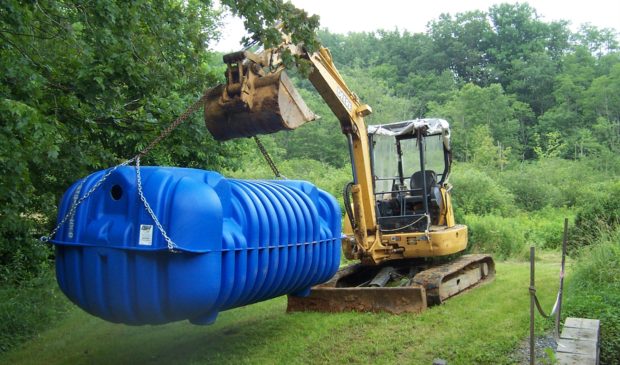A big problem for low-income homeowners: septic tanks
Monday, April 1, 2019 by
Jack Craver For the most part, living in rural Travis County is cheaper than living in the city of Austin. Land values, property taxes and rents are all significantly lower. Sewage, however, often costs significantly more.
The problems and costs associated with aging septic tanks is such a common problem that in recent years Travis County has begun to dedicate a significant portion of money it receives from the federal Community Development Block Grant program to helping low-income homeowners repair or replace their systems.
Since 2013, the county has used a portion of its roughly $1.2 million annual CDBG funds to do home repairs for low-income residents in unincorporated parts of Travis County. The assistance is available only to homeowners with incomes no higher than 80 percent of the area median. That amounts to $48,200 for a single person, $55,050 for a two-person household or $68,800 for a family of four.
From 2012-18, the county has spent $2.56 million on home repair, or 38 percent of the total CDBG funding. That funding has helped repair 97 homes or septic systems.
“We realized a lot of people who needed home repair were having a lot of issues with their septic system,” said Christy Moffett, the CDBG program manager for Travis County. “We carved out money just for septic systems. It was taking up the bulk of the budget for people who needed home repair.”
The county’s CDBG funds cannot be used to pay for services in the city of Austin or other municipalities that have their own dedicated grant funding. The Travis County grant is focused on unincorporated parts of the county as well as the tiny villages of Webberville and San Leanna, which do not receive their own grants.
This isn’t as much of an issue for residents of Austin, who get their water and wastewater services from Austin Water, the municipal utility. However, those in unincorporated areas often have to fend for themselves via septic systems.
The cost of a new septic system is usually between $18,000 and $22,000, said Moffett, when accounting for the cost of design, engineering, permitting, and the land survey that is often required.
Stuart Hersh, a longtime housing advocate, encouraged the commissioners to keep home and septic repair top priorities for CDBG funds.
“It is really remarkable that in some unincorporated parts of Travis County, as well as in the city limits, we still have some extremely low-income homeowners who are trying to balance the needs of affordability by staying in their home and safety by getting their homes repaired,” he said.
Fidel Acevedo, a 40-year resident of North Ridge Acres, a subdivision just south of State Highway 45 in northern Travis County, said that he would appreciate septic improvements but that preferably the subdivision could get hooked up to a full-fledged sewer system. The area is rapidly developing, he noted.
On Tuesday, at a meeting of the Travis County Commissioners Court, County Judge Sarah Eckhardt said she would like the Commissioners Court to consider how the county could get involved in extending water and wastewater service to unincorporated areas. Traditionally, the county has played no role in providing those services.
Setting up water and wastewater service requires far more money than CDBG can provide, said Moffett. Most likely, she said, the county will need to find other “partners,” such as the city of Austin.
Photo by Soil Science made available through a Creative Commons license.
The Austin Monitor’s work is made possible by donations from the community. Though our reporting covers donors from time to time, we are careful to keep business and editorial efforts separate while maintaining transparency. A complete list of donors is available here, and our code of ethics is explained here.
You're a community leader
And we’re honored you look to us for serious, in-depth news. You know a strong community needs local and dedicated watchdog reporting. We’re here for you and that won’t change. Now will you take the powerful next step and support our nonprofit news organization?



